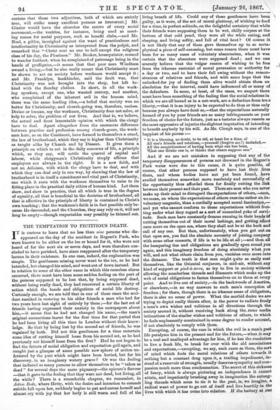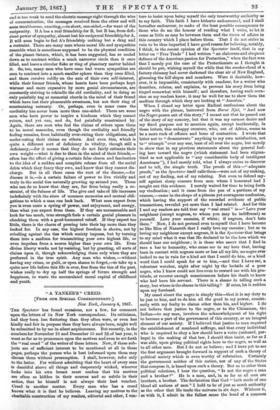THE TEMPTATION TO FICTITIOUS DEATH.
TT is curious to learn that no less than nine persons who dia- j appeared on the day of the accident in Regent's Park, who were known to be either on the ice or bound for it, who were not heard of for the next six or seven days, and were therefore con- cluded to have perished, have since reappeared after the temporary lacuna in their existence. In one case, indeed, the explanation was simple. The gentleman missing never went to the ice, as he had intended, but changed his mind, and went out of town instead. But in relation to some of the other cases in which this causeless alarm occurred, there must have been some sudden feeling on the part of the persons supposed to be lost that, by being supposed dead, without being really dead, they had recovered a certain liberty of action which the bonds and obligations of social life destroy. Curiously enough, we are told that in one of these cases the acci- dent resulted in restoring to his older friends a man who had for two years been lost sight of entirely by them ;—for the last set of friends having expressed their anxiety in the newspapers about him,—it seems that he had not changed his name, —the man's original connections learnt for the first time for that period that he had been living all this time in London without their know- ledge. So that by being lost by the second set of friends, he was regained by both. Did not this gentleman for a time entertain some idea of cutting himself loose from his second set, as he had previously cut himself loose from the first? Had he not begun to find the fetters of social obligation and expectation gall again, and caught just a glimpse of some possible new sphere of action un- fettered by the past which might have been buried, but for his discovery, in an imaginary watery grave? Or was the feeling that induced so many persons to allow themselves to be " taken as dead " for several days the mere piquancy—the epicure's flavour —that it gave to the feeling that they were not dead, but living, all the while ? There is a remarkable chapter, we remember, in Adam Bede, where Hetty, with the desire and intention to commit suicide full upon her, suddenly begins to pat and caress herself and almost cry with joy that her body is still warm and full of the
living breath of life. Could any of these gentlemen have been ■ guilty, as it were, of the act of moral gluttony, of wishing to feed for a time, in perfect solitude, on the delightful certainty that while their friends were supposing them to be wet, chilly corpses at the bottom of that cold pond, they were all the while eating, and
sleeping, and living softly, and full of vital heat ? Of course it
is not likely that any of them gave themselves up to so meta- physical a piece of self-caressing, but some reason there must have been for so many cases of voluntary absenteeism, when it was certain that the absentees were supposed dead ; and we can scarcely believe that the vulgar reason of wishing to be free from the irksome restraint of moral persuasion or authority for a day or two, and to have their full swing without the remon- strances of relatives and friends, and with some hope that the unlooked-for joy of finding them alive would obtain them an absolution for the interval, could have influenced all or many of the defaulters. In some, at least, of the cases, we suspect there must have been something of the feeling that the social relations in which we are all bound as in a net-work, are a. deduction from tru e liberty,—that it is an injury to be expected to do thus or thus only because you always have dont so,—that the expectifions naturally formed of you by your friends are so many infringements on your freedom of choice for the future, just as a testator always resents as the most oppressive of injuries the slightest imputation of intending to benefit anybody by his will. As Mr. Clough says, in one of the happiest of his poems :-
" It is a blessing, no doubt, to be rid, at least for a time, of All one's friends and relations,—yourself (forgive me!) included,— All the assujettissement of having been what one has been, Wad one thinks one is, or thinks that others suppose one."
And if we are not mistaken in supposing that any of the temporary disappearances of persons not drowned in the Regent's Park water were due to this cause, it is quite possible, of course, that other persons supposed to have lost their lives there, and whose bodies have not yet been found, have availed themselves somewhat more resolutely and successfully of the opportunity thus afforded them for finally cutting the link between their present and their past. There are men who can never make up their mind to disregard the expectations of others, —men,
we mean, on whom the expectations of others exercise rather an in- voluntary magnetic, than a cordially accepted moral fascination,— and yet who cannot conform to those expectations without fret-
ting under what they regard as a sort of unmerited yoke of servi- tude. Such men have constantly dreams running in their heads of cutting themselves out of their moral lashings, and getting afloat once more on the open sea, where they shall not be at the beck and call of any one. But then, unfortunately, when you get oat on that open sea, you find the absolute necessity of joining company with some other consorts, if life is to be life at all ;—and then all the hampering ties and obligations are gradually spun round you again, and this imaginary freedom of doing absolutely what you will, and not what others claim from you, vanishes once more into the distance. The truth is that men might quite as easily seat themselves, like the Oriental conjurors, in mid-air, without any
kind of support or pied-&-terre, as try to live in society without allowing the numberless threads and filaments which make up the
web of social obligations to fasten themselves on to them at every point. And to live out of society,—in the backwoods of America, or elsewhere,—in no way answers to such men's conception of freedom ; for there, though there is no irksome sense of obligation, there is also no sense of power. What the morbid desire we are trying to depict really thirsts after, is the power to radiate freely a man's own wishes and volition in all directions through the society around it, without receiving back along the same media intimations of the similar wishes and volition of others, to which he feels unpleasantly constrained in some degree to render account, if not absolutely to comply with !.hem.
Excepting, of course, the case in which the evil in a man's, past life paralyzes him in the present and for the future,—when it may be a real and nnalloyed advantage for him, if he has the resolution to live a fresh life, to break for ever with the old associations and expectations,—excepting, we say, such cases as these, the sort of mind which feels the moral relations of others towards it nothing but a constant drag upon it, a trailing impediment, in- stead of a reservoir of strength, usually deserves sympathy and com- passion much more than condemnation. The secret of this sickness of fancy, which is always picturing an independence it cannot attain, and impatiently brushing away in imagination the entang- ling threads which seem to tie it to the past, is, we imagine, a radical want of power to go out of itself and live heartily in the lives with which it has come into relation. If the battery at one
end is too weak to send the electric message right through the wire of communication, the messages received from the other end will seem troublesome, exacting,—in short, one-sided,—for want of the reciprocity. If A has a real friendship for B, but B has, from defi- cient power of sympathy, almost lost his reciprocal friendship for A, B will soon begin to feel A's friendship nothing but a drag and a restraint. There are many men whose moral life and sympathies resemble what is sometimes supposed to be the physical condition of the planet Saturn, which, it has been suggested, has so cooled down as to contract within a much narrower circle than it once filled, and leave a circular flake pr ring of planetary matter behind it. So, too, many men who have once had warm sympathies are seen to contract into a much smaller sphere than they once filled, and there revolve coldly on the axis of their own self-interest, while their former friends, whose hearts have been perhaps kept warmer and more expansive by more genial circumstances, are constantly striving to rekindle the old cordiality, and in doing so only painfully tug at memorial chords in the mind of their friend which have lost their pleasurable sweetness, but not their ring of constraining entreaty. Or, perhaps, even in some cases the- cordiality has never been more than one-sided. There are some men who have power to inspire a kindness which they cannot return, and yet can, and do, feel painfully constrained by. Again, there are men who feel the claims of others upon them to be moral manacles, even though the cordiality and friendly feeling remains, from habitually over-rating their obligations, and under-rating their claims on others. And even this, which is quite a different sort of deficiency in vitality, though still a deficiency,—for it means that they do not fairly estimate their own weight—what is due to them in the mind of their friends,— often has the effect of giving a certain false charm and fascination to the idea of a sudden and complete release from all the social debts which they fancy they owe, and know that they cannot dis- charge. But in all these cases the root of the disease,—for disease it is,—is a certain failure of power to live vividly and truly in the social ties naturally growing up around you. Those who can do so know that they are, far from being really a re- straint, of the fulness of life. The give and take of life increases indefinitely with the store of common memories and mutual obli- gations to which a man can look back. What men expect from you is even more a spring of power, and enjoyment, and energy, than what you expect from them. If they are unreasonable and look for too much, true strength feels a certain genial pleasure in checking them with a good-humoured rebuff. If they expect too little, there is the charm of pouring into their lap more than they looked for. In any case, the highest freedom is shown, not by rebelling against the ties which society imposes, but by turning them into a medium for transmitting your own highest life, or even impulses from a source higher than your own life. Even divine liberty works not by resisting, but by granting, all sorts of claims upon it, though acknowledging them only when they are preferred in the true spirit. Any man who wishes, —without having any crime, or guilt, or open shame to forget,—to take up a quite new life before this life is over, free from the ties of the past, wishes really to dry up half the springs of future strength and happiness, to waste the accumulated moral capital of childhood and youth.































 Previous page
Previous page